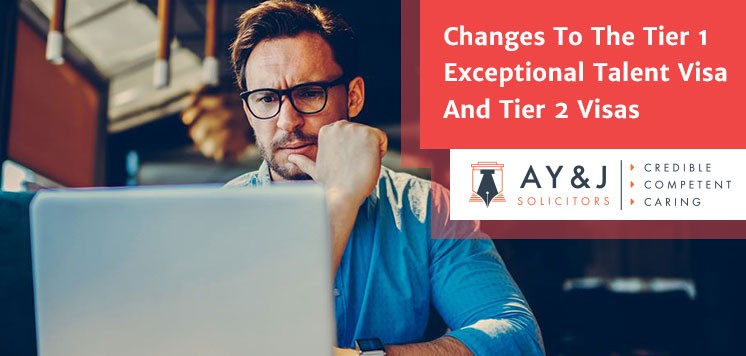Disclaimer: The information in this blog is accurate as of its publication date. Any updates after that date are not reflected here.
In September 2019, the British Government released a Statement of Change to the Immigration Rules.
These changes come into effect on 1 October 2019. Of special interest are the variations to the rules relating to the Tier 1 Exceptional Talent Visa and the Tier 2 (General) Category.
The changes are as follows:
Table of Contents
Tier 1 Exceptional Talent Visa
The Tier 1 Exceptional Talent Visa provides a way for recognised talented people to live and work in the UK without needing to find sponsored employment. As well as working as an employee, they can also be a freelancer or be self-employed.
To qualify for the visa, applicants must meet rigorous endorsement criteria and achieve endorsement from a Designated Competent Body.
The fields in which a person can qualify for endorsement are science, humanities, engineering, the arts, and digital technology.
The September 2019 Statement of Change provides the following based on requests by Tech Nation, a Designated Competent Body:
- Three letters of support, as opposed to the current requirement of two, from established digital technology organisations, will be required. An extra letter will allow for a more in-depth analysis of the applicant’s achievements and contributions to the sector.
- The phrase ‘product-led’ has been added to the requirements to ensure migrants with the appropriate skill set use the route.
- Minor changes have been made to bring harmony between the Immigration Rules and Guidance.
To increase the number of applicants in science, engineering, and humanities, The Royal Society, The Royal Academy of Engineering, and The British Academy have championed the following changes:
- Expanded the list of peer-reviewed fellowships to include fellowships awarded by the National Institute for Health Research;
- Expanded the criteria to include applicants who have held a peer-reviewed fellowship in the 12 months immediately before the date of application; and,
- Expanded the application criteria to allow a wider range of eligible senior academic or research positions to qualify.
Tier 2 (General) Visa
Tier 2 (General) Visa provides a route for migrants from outside the European Economic Area (EEA) to work for an employer who holds a UK Sponsor Licence. It is subject to an annual limit of 20,700 places, divided into monthly allocations.
The changes to come into force on 1 October 2019 are as follows:
- PhD level occupations will be exempted from the annual place limit. This is to encourage researchers and highly skilled individuals to come to the UK and free up Tier 2 for other key roles that contribute to the UK economy.
- Applicants whose occupations are at the PhD level, and who undertake research overseas directly related to their Tier 2 employment, will not have that absence ‘counted’ when applying for Indefinite Leave to Remain.
- Jobs added on the “Teaching Vacancies” section on GOV.UK is an acceptable form of advertising for a Resident Labour Market Test.
- Minor amendments are being made to Appendix J to correct salary rates for a small number of occupational codes. These rates apply to applications made with a Certificate of Sponsorship assigned on or after 6 October 2019.
- Migrants will not be penalised when applying for Settlement if absences from work due to sickness, statutory parental leave, assisting in a national or international humanitarian or environmental crisis or engaging in legal strike action see their pay fall below the required threshold.
- Appendix B and Tier 2 (General) requirements have been amended to exempt doctors, dentists and nurses and midwives, when making a Tier 2 (General) application, from having to sit an approved English Language Test if they have already passed an English test accepted by the relevant professional regulatory body. A corresponding amendment is also being made to provide that Tier 2 doctors, dentists nurses and midwives who have passed such a test are treated as having demonstrated sufficient knowledge of the English language for the purpose of Indefinite Leave to Remain.
- Approved English language test providers will in future be published on the GOV.UK website.
- Documents proving that an applicant has sat an approved English language test will no longer be required. Instead, applicants will simply need to provide a unique reference number for checking.
Amendments to the Shortage Occupation List
The Shortage Occupation List is reviewed by the independent Migration Advisory Committee which published its latest review findings on 29 May 2019.
The changes are that:
- New occupations have been added, such as 2112 Biological scientists and biochemists, and 2216 Veterinarians and a small number removed, such as 1123 Production Manager and directors in mining and energy;
- A significant number of Standard Occupational Classification (SOC) codes already on the Shortage Occupation List (SOL) but only for limited types of jobs, have been extended to cover all jobs in that occupation code;
- The qualifying company criteria applying to Digitech occupations has been amended/removed; and,
- There are now no restrictions on chefs working in a takeaway establishment.
The Migration Advisory Review also made two further recommendations which have been taken up.
- Re-classifying from Regulated Qualifications Framework Level 4 to Level 6 the occupation of chartered architectural technologist. This means that employers may sponsor overseas applicants where no suitable resident worker is available.
- Allowing overhead lines workers, at Linesman Erector 2 (LE2) level and above (SOC 5249) to qualify for Tier 2 (General) with a Resident Labour Market Test if the jobholder’s pay is at least £32,000 per year. This will prevent the occupation from returning to shortage.
A Y & J Solicitors are specialists in immigration law based in central London. If you would like more information regarding the above changes to the Immigration Rules and Guidance, please contact us at contact@ayjsolicitors.com or call +44 20 7404 7933.
Disclaimer: No material/information provided on this website should be construed as legal advice. Readers should seek an appropriate professional advice for their immigration matters.









